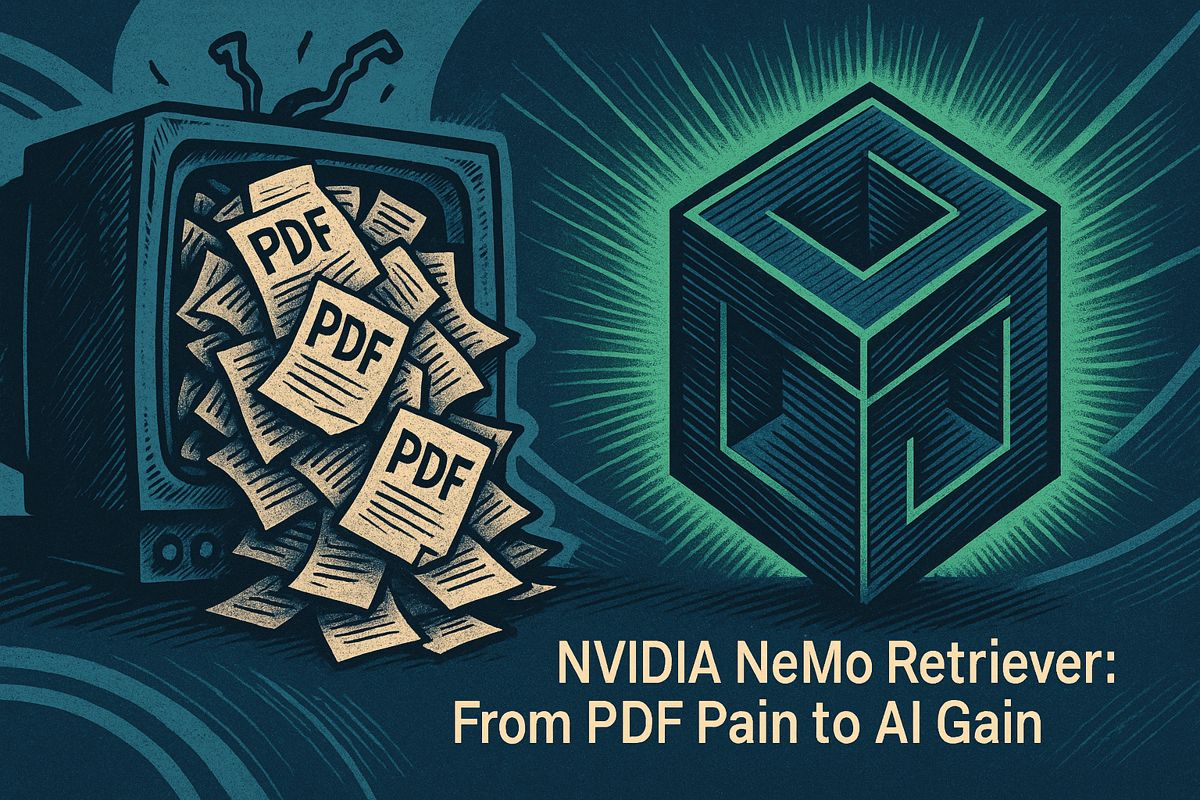NeMo Retriever: Turning the PDF Pile into Gold
Serge Bulaev
Imagine a magical tool that turns mountains of documents, like PDFs, into sparkling gold! NVIDIA's NeMo Retriever is that very magic, working super fast to grab all the important stuff from your papers. It's like having a supersmart friend who can read 15 times quicker than you, find what you need 50% better, and even shrink huge piles of files into tiny lockers. This amazing tool is changing how we search for information, do research, and keep track of rules, making life much easier

Imagine a magical tool that turns mountains of documents, like PDFs, into sparkling gold! NVIDIA's NeMo Retriever is that very magic, working super fast to grab all the important stuff from your papers. It's like having a super-smart friend who can read 15 times quicker than you, find what you need 50% better, and even shrink huge piles of files into tiny lockers. This amazing tool is changing how we search for information, do research, and keep track of rules, making life much easier for big companies and anyone buried under papers.
What is NeMo Retriever and how does it revolutionize data extraction?
NeMo Retriever is NVIDIA's advanced tool designed to rapidly extract and process data from diverse documents like PDFs. It boasts 15x faster extraction, 50% higher retrieval accuracy, and a remarkable 35-fold reduction in storage, making it a game-changer for enterprise search, real-time research, and compliance by efficiently turning document piles into actionable insights.
When PDF Nightmares Meet Machine Intelligence
Have you ever stared down a tower of client reports and felt a pulse of dread? I remember one especially punishing night: my desk drowned under dozens of files, like a paper mill exploded beside me. The whir of the office fan, the smell of burnt coffee - memories etched in caffeine. It's odd, but NVIDIA's recent NeMo Retriever announcement dragged me right back there. What if I'd had something smarter, faster, less likely to crash at 3 a.m.? Not nostalgia - just the kind of regret that tastes like stale espresso.
Let's cut to specifics. NVIDIA claims that NeMo Retriever extracts data from PDFs fifteen times faster than legacy methods. That's not marketing fluff. I've written Python scripts that wheezed for hours over simple tables, and here's a tool that could compress a week's work into one night. For reference, the engine powering everything is the Llama 3.2 NeMo Retriever Multimodal Embedding 1B - just 1.6 billion parameters. Not colossal, but clearly enough. Why does this matter? Because every saved hour is a little victory over entropy. Or maybe just another hour of sleep for me.
Breaking Down the Claims (And Raising an Eyebrow)
You can't just breeze past claims like these, right? NeMo Retriever touts a 50 percent leap in retrieval accuracy. In retrieval-augmented generation systems, the line between "good enough" and "actually helpful" can be, well, cavernous. That difference means fewer hallucinated snippets, less embarrassment, and - dare I say - greater faith in automation. Sometimes I ask myself: Is it really this much better? The documentation suggests so, and in industries like finance or healthcare, a single incorrect answer can spell disaster. Trust isn't bought; it's earned, and lost in a heartbeat.
But the kicker for me is the storage efficiency: a 35-fold reduction. It's like shrinking the Library of Alexandria into a filing cabinet. For any enterprise juggling compliance, Azure bills, and terabytes of customer records, this isn't a "nice to have" - it's a game-changer. I confess, I once scoffed at compact models. Bigger was always better, or so I thought. Turns out, the right architecture trumps brute force. Lesson learned, albeit a little late.
From the Lab to the Boardroom, and Everywhere In Between
So what can you actually do with all this? The use cases read like an ambitious CEO's wish list. Enterprise search that skims wikis, emails, contracts, even images and charts - all at once. Real-time research, customer support that doesn't just parrot FAQs, compliance assistants for the regulatory labyrinth. Did I mention multilingual support? That's a quiet revolution for global teams. Imagine solving a legal query in Tokyo, then finding your HR forms in São Paulo, all through a single dashboard.
Security? The safeguard features are robust: safetensors, ongoing CVE patching, deployments to suit every corporate whim. More than once, I've heard the excuse: "Sure, but is it secure?" Well, here's an answer. Try it yourself on the NVIDIA developer portal (build.nvidia.com/retrieval) or on Hugging Face. You might find a few surprises, or at least a moment of relief. Next time I pass a mountain of PDFs, I'll just grin and - who knows - maybe even snort with satisfaction.